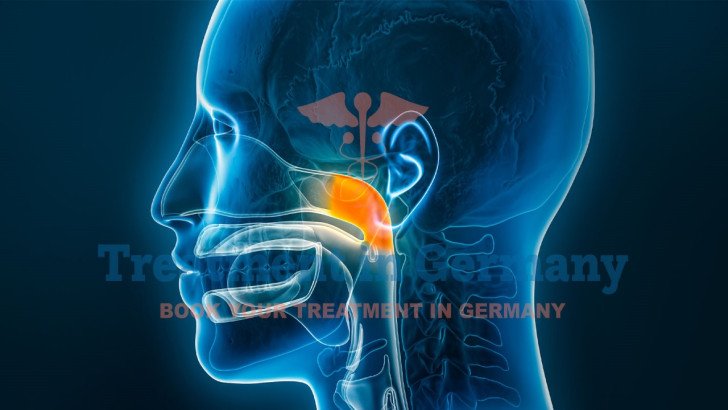
Nasopharyngeal cancer (NPC), also known as nasopharyngeal carcinoma, is a rare type of head and neck cancer.
Nasopharyngeal cancer (NPC) is a rare but serious form of cancer that originates in the nasopharynx, the area located behind the nose and above the back of the throat. This type of cancer can be difficult to diagnose, but with advanced medical technologies and treatment options, patients can achieve better outcomes. Germany has emerged as a leading destination for nasopharyngeal cancer treatment due to its world-class healthcare facilities, cutting-edge technologies, and skilled specialists.
What is Nasopharyngeal Cancer?
Nasopharyngeal cancer occurs in the nasopharynx, the area that connects the nose and the back of the throat. It is classified as a type of head and neck cancer and is often detected at a later stage, making early diagnosis and treatment critical. This cancer can be aggressive and spread to nearby lymph nodes, making it essential to consult medical professionals for timely treatment.
There are three main types of nasopharyngeal cancer:
Causes of Nasopharyngeal Cancer
While the exact cause of nasopharyngeal cancer is unknown, several risk factors may contribute to its development, including:
Symptoms of Nasopharyngeal Cancer
The symptoms of nasopharyngeal cancer can vary depending on the location and stage of the tumor. Common symptoms include:
Persistent nasal congestion
Nosebleeds
Hearing loss
Ear infections
Headaches
Swelling of the neck due to lymph node involvement
Pain or a lump in the throat
Diagnosis and Diagnostic Tools
To diagnose nasopharyngeal cancer, doctors use various tools and tests to detect the presence of cancer and its extent. Common diagnostic tools include:
Nasopharyngeal Cancer Treatment in Germany
Germany offers some of the most advanced nasopharyngeal cancer treatment options in the world, with a combination of surgery, radiation therapy, chemotherapy, and innovative treatments. Patients can benefit from world-class medical care in leading hospitals and specialized centers.
Advanced Nasopharyngeal Cancer Therapy in Germany
Germany is renowned for its advanced nasopharyngeal cancer treatment options, including:
Innovative Nasopharyngeal Cancer Treatments in Germany
Germany also leads the way in offering innovative treatment options for nasopharyngeal cancer, including:
Dendritic Cell Therapy: A Complimentary Therapy for Nasopharyngeal Cancer in Germany
Dendritic cell therapy is an innovative treatment option being explored for nasopharyngeal cancer in Germany. This therapy involves collecting dendritic cells from the patient's body, modifying them in the laboratory, and then reintroducing them into the body to help the immune system target and attack cancer cells more effectively. It is often used as a complementary therapy alongside traditional treatments like chemotherapy and radiation.
Prevention and Management of Nasopharyngeal Cancer
While complete prevention of nasopharyngeal cancer may not be possible, certain steps can help reduce the risk:
Avoid smoking and excessive alcohol consumption.
Get vaccinated against the Epstein-Barr virus (EBV) when available.
Maintain a healthy diet rich in fruits and vegetables while avoiding preserved and salted foods.
Regular medical check-ups: Early detection through regular screenings is key for managing the cancer in its early stages.
After treatment, patients should follow a management plan that includes regular follow-ups, a healthy lifestyle, and psychological support to cope with the emotional challenges of cancer.
Why Choose Treatment in Germany?
Germany is one of the best destinations for nasopharyngeal cancer treatment due to:
🌍Why Patients Worldwide Prefer Our Medical Services in Germany – Key Benefits Explained:
FAQs
How much does nasopharyngeal cancer treatment cost in Germany?
The cost of nasopharyngeal cancer treatment in Germany can vary depending on the stage of cancer and the type of treatment required. Generally, advanced treatments such as immunotherapy and dendritic cell therapy can be expensive, but Germany’s healthcare system offers competitive pricing for international patients.
What are the latest nasopharyngeal cancer treatment options available in Germany?
Germany offers innovative nasopharyngeal cancer treatments like immunotherapy, targeted therapy, and dendritic cell therapy, which are at the forefront of cancer treatment.
How long is the waiting time for nasopharyngeal cancer treatment in Germany?
The waiting time for nasopharyngeal cancer treatment in Germany can vary depending on the hospital and urgency of the case. However, German hospitals prioritize cancer patients for timely treatment.
Is follow-up care available after treatment in Germany?
Yes, follow-up care is provided to ensure patients are recovering well after their treatment. This may include regular check-ups, psychological support, and rehabilitation.
Can I get a cost estimate before traveling to Germany?
Yes, many German hospitals offer cost estimates for treatment. These can be obtained by consulting with the hospital’s international patient department.
Are nutrition and psychological support included in the treatment plan?
Yes, comprehensive care in Germany often includes nutritional guidance and psychological support to help patients manage the physical and emotional challenges of cancer treatment.
Are there clinical trials for nasopharyngeal cancer treatment in Germany?
Yes, clinical trials for nasopharyngeal cancer are available at leading hospitals and research centers in Germany, offering patients access to cutting-edge treatments.
How does nasopharyngeal cancer treatment in Germany compare to other countries?
Germany’s healthcare system is among the best in the world, offering the latest treatments and the highest standards of care, making it a preferred destination for nasopharyngeal cancer treatment.
Conclusion
Germany’s advanced medical technologies, experienced specialists, and innovative treatments make it a top choice for patients seeking nasopharyngeal cancer treatment. With a combination of conventional therapies and cutting-edge options like dendritic cell therapy, patients in Germany can receive comprehensive care that maximizes their chances of recovery.
Kindly complete the form below, and our dedicated team will reach out to you promptly. We look forward to connecting with you soon!
Trierer Straße, 56072 Koblenz, Germany

.webp)
 (1).webp)

.webp)
 (1).webp)


.webp)
 (1).webp)

.webp)
 (1).webp)
